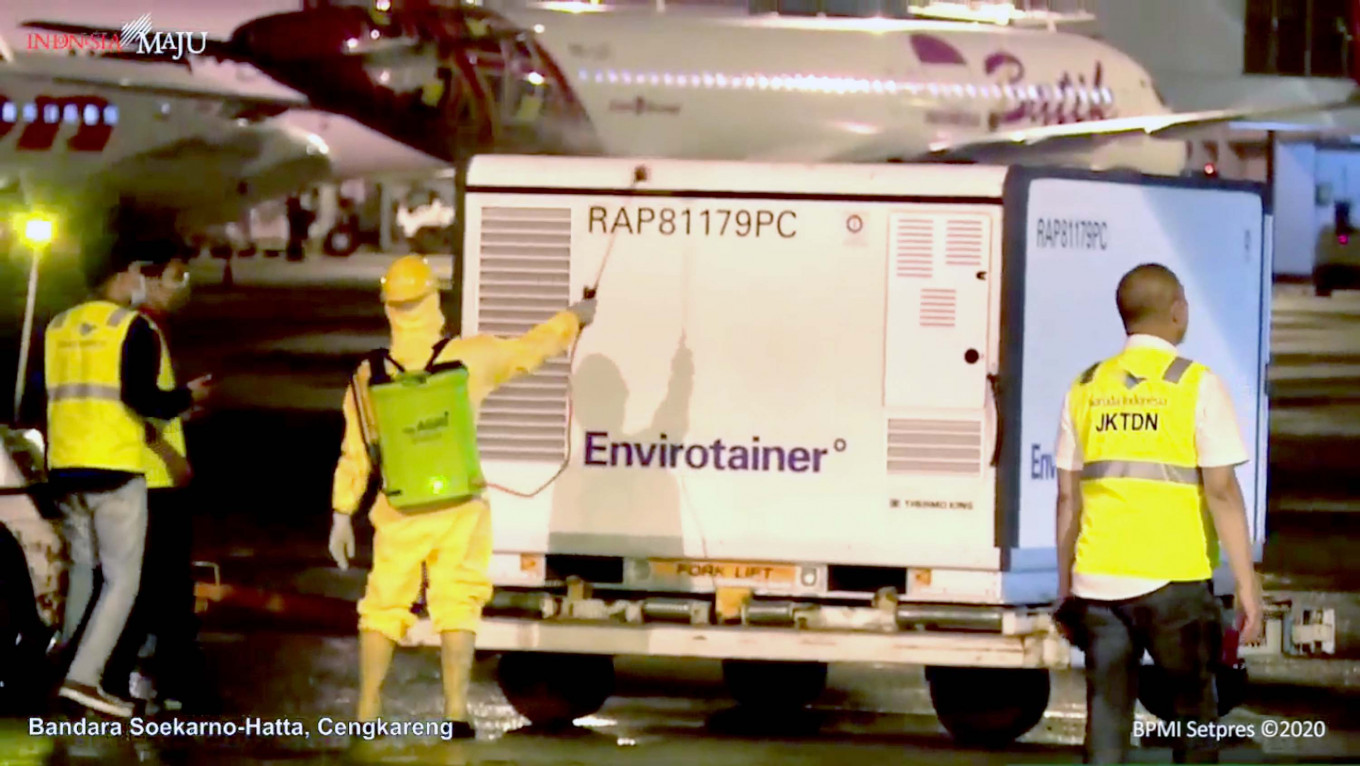Popular Reads
Top Results
Can't find what you're looking for?
View all search resultsPopular Reads
Top Results
Can't find what you're looking for?
View all search resultsVaccine doubts point to flaws in govt’s COVID-19 message
Change text size
Gift Premium Articles
to Anyone
T
he arrival of the first batch of China's CoronaVac vaccine in Indonesia, a country struggling to contain the COVID-19 outbreak, has brought as much caution as it has hope, with medical workers – the priority group for vaccination – still questioning its efficacy and safety.
After breaking several records for daily COVID-19 cases and fatalities in recent weeks, Indonesia received 1.2 million doses of the candidate vaccine from Chinese biopharmaceutical company Sinovac Biotech in the late hours of Sunday.
The COVID-19 handling and national economic recovery committee soon shared the news on its social media channels by uploading a picture of a kid jumping with the caption: "Vaccines have arrived, I am happy.”
But the sentiment was not shared by the entire public, including some members of the medical community who have been promised by the government to be among the first people to get vaccinated.
On social media, questions about the vaccine's efficacy and safety emerged as netizens pointed to an absence of data on it. Other vaccines have disclosed their efficacy claims from ongoing final-stage clinical trials.
Internet personality and medical school graduate Tirta Hudhi aka dr. Tirta expressed his concern over the efficacy and safety of the vaccine. In a Twitter post of his that has been retweeted over 100 times, he asked officials to get vaccinated before medical workers.
A doctor working at a COVID-19 referral hospital in Jakarta who asked to be identified only as Robby said that he expected medical workers to be administered only with vaccines that had evident reports of efficacy, rather than ending up with “a pig in a poke”.
"Up until now, I personally would prefer Pfizer or Moderna vaccines, rather than CoronaVac, due to issues over information disclosure on its efficacy and safety," he said.
American biotechnology company Moderna's candidate vaccine has said that its primary efficacy analysis showed the vaccine had 94.1 percent efficacy. American multinational pharmaceutical corporation Pfizer and German biotechnology firm BioNTech reported that their analysis indicated a rate of 95 percent efficacy.
Meanwhile, British drugmaker AstraZeneca said that its interim analysis on its candidate vaccine with Oxford University indicated 90 percent efficacy and 62 percent efficacy from two different dosing regimens, resulting in an average of 70 percent. Despite the relatively high rates, reports have quoted experts as calling for caution in taking on these efficacy claims.
Sinovac has not provided any data on its efficacy, although according to the Indonesian Food and Drug Monitoring Agency (BPOM), interim results from CoronaVac trials in Indonesia and Brazil were expected by January next year. The agency will use this data when determining whether to issue emergency use authorization for the vaccine.
Yunus Kuntawi Aji, a doctor at a COVID-19 referral hospital, also shared his concern to over 5,000 followers on his Twitter account.
“I’ll have to first see for myself about the reports on efficacy and adverse effects from [CoronaVac's] phase 3 clinical trials,” he told The Jakarta Post. “If it has an efficacy that is as good as that of vaccines produced by Pfizer and Moderna, at least above 90 percent, and no meaningful adverse effects, I will use it.”
Even with existing vaccines for other diseases, former and current health authorities and experts have pointed to difficulties in reaching desired coverage due to anti-vaccine campaigns, while logistical challenges have been expressed over cold chain infrastructure not being evenly distributed across regions.
Airlangga University epidemiologist Laura Navika Yamani said the government had "failed" in its COVID-19 message since the start. The government and vaccine producers should have been transparent with data on clinical trials, she said.
The government has also been urged to explain to the public why it chose the Sinovac candidate vaccine over other options, with the question of whether it is because it can be stored in higher temperatures compared to its Pfizer or Moderna mRNA counterparts being raised.
Indonesia already has cold chain infrastructure that fits the Sinovac vaccine, potentially allowing for easier distribution to small, far-flung regions.
Gaining people's trust could be vital to reach the desired vaccination coverage, especially if the government aimed for herd immunity. A lower rate of efficacy would also mean greater coverage, Laura said.
"[This is] especially [important] with medical workers, who are more knowledgeable about vaccines. The general public will also take their opinions into account as well,” she said.
State-owned pharmaceutical company Bio Farma, in charge of running CoronaVac trials and production and distribution, said the first stage of vaccination would be rolled out for medical workers in seven provinces across Java and Bali, before moving on to other provinces.
"Sinovac's quality system has been acknowledged by the World Health Organization and there are technology experts in the partnership," Bio Farma executive director Honesti Basyir said.
-- Arya Dipa contributed to the story from Bandung, West Java










